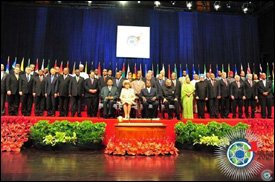
Commonwealth Leaders In Trinidad 2009
Basseterre, St. Kitts – Nevis
November 29, 2009 (CUOPM)
Commonwealth leaders including St. Kitts and Nevis Prime Minister Hon. Dr. Denzil L. Douglas ended their three-day summit on Sunday, convinced of the relevance of the organisation of mainly former British colonies to a changing global environment as well as adopting a united position on climate change ahead of an important United Nations conference in Denmark next month.
CMC’s Peter Richards reporting from Port of Spain, Trinidad, said Prime Minister Patrick Manning, who chaired the 21st Commonwealth Heads of Government Meeting (CHOGM), described the event as “a significant success” a position also echoed by many of the leaders of the 54-nation grouping.
“What we have demonstrated is that diversity can easily be turned into strength,” Manning told the end of summit news conference, referring to the diverse membership of the grouping that also includes countries belonging to the G-20 grouping and developing nations.
The summit also agreed during their meeting to the application by Rwanda, which one Commonwealth leader described as “a wise decision.”
Manning said that the meeting had adopted six positions on various issues including climate change, non-communicable diseases, a re-affirmation of the principles and values of the Commonwealth as well as the involvement of young people in the organisation.
In their “Port of Spain Climate Change Consensus” issued here on Saturday, the Commonwealth leaders urged that the proposed Copenhagen Launch Fund starting next year be established “to level of resources of US$10 billion annually by 2012.”
They said that fast start for adaptation should be focussed on the most vulnerable countries and also welcomed a proposal to provide “immediate fast disbursing assistance with a dedicated system for small island states and associated low-lying coastal states of the Alliance of Small Island States (AOSIS) of at least 10 percent of the fund”.
“We also recognise the need for further, specified and comparable funding streams, to assist the poorest and most vulnerable countries, to cope with, and adapt to the adverse impacts of climate change. We recognise that funding will be scaled up beyond 2012,” the leaders said.
New Zealand Prime Minister John Key said that the fund represents a “bottom line to getting an agreement” on climate change in Copenhagen and promised that Wellington will provide 10 to 50 million dollars to the fund.
“The reality of climate change is that there will be a lot of movement to help islands affected by climate change,” Key said.
Earlier, Commonwealth Secretary General Kamalesh Sharma, said that he was pleased with the commitment of Commonwealth countries towards the climate change issue, noting that in the past “there had been heavy traffic on the road to Copenhagen (and) the good news is that it is converging and we will have one road to travel.”
Sharma, like Manning acknowledged that the Commonwealth had “broken new ground” when it allowed non-members such as French President Nicolas Sarkozy, United Nations Secretary General Bank Ki-moon and the Prime Minister of Denmark Lars Lokke Rasmussen, to participate in its deliberations, which they felt underscored the importance of the Commonwealth to a changing global environment.
Sharma said that the Port of Spain Climate Change Consensus would go “some considerable distance in reaching a consensus in Copenhagen” when the United Nations Conference on Climate Change will be held from December 7-18.
Australian Prime Minister Kevin Rudd said that the task now for the Commonwealth in the future “is to take this great institution…and apply it to the global agenda of the day.”
“The fact that we have combined our voices as one…is itself a remarkable achievement,” he said while the Samoa Prime Minister Tuilaepa Lupesoliai Sailele Malielegaoi said the meeting “did not shy away from difficult items ranging from climate change to illegal arms trade.
The Malaysian Prime Minister Dato’ Sri Najib Mohd Razak said the summit had re-affirmed the Commonwealth’s position on the global stage.
He said while he had come to the meeting here with “an open mind” there were lingering doubts on its ability to deal with many issues confronting the global community of which the Commonwealth represents more than a one third of the world’s population.
“This CHOGM has truly answered that question as an institution (it) is still very much relevant,” he said, while South Africa’s President Jacob Zuma said prior to the conference he had met with the Secretary General to express his views on the Commonwealth.
“I think some of my questions have been answered,” he said, noting that the manner in which the summit dealt with the issue of climate change “indicates we are dealing with a CHOGM of today”.
The leaders said that they also discussed the situation in Zimbabwe and welcomed the Global Political Agreement on power sharing while expressing the hope that this would be “implemented faithfully and effectively.”
They looked forward to the conditions being created for the return of Zimbabwe to the Commonwealth,” according to the communiqué issued at the end of the meeting.
On the global economic and financial crisis, the Commonwealth leaders said they welcomed the various initiatives to help lessen the impact and expressed their support for the commitment to avoid protectionism and to strengthen financial supervisions and regulation.
“They expressed concern however, that the social and economic impact of the crisis would continue to affect a vast majority of the developing countries, particularly the smallest and most economically vulnerable members of the Commonwealth…”
The leaders also felt that the measures were need to “address the plight of many middle-income countries which are highly susceptible to external shock but do not have access to concessionary loans and grants”.
“Heads therefore welcomed the Commonwealth Secretariat’s work to address the economic challenges facing these economically vulnerable member states and urged that urgent measures be taken to provide support for them, especially in accessing adequate financing,” the communiqué added.
The next CHOGM will be held in Australia in 2011.